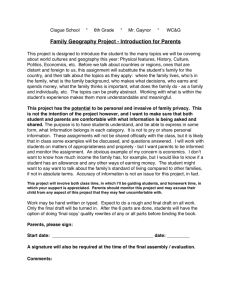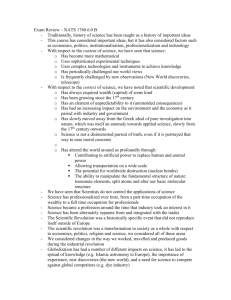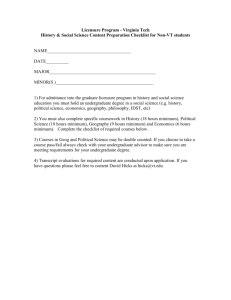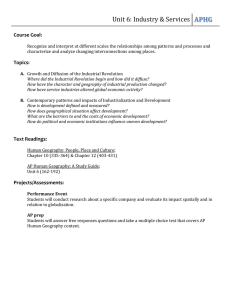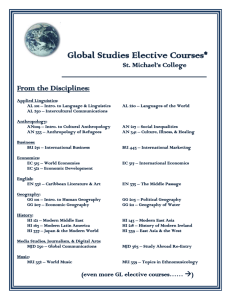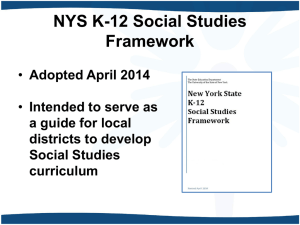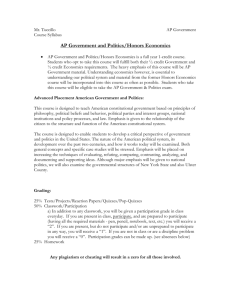Lenses of History Notes
advertisement
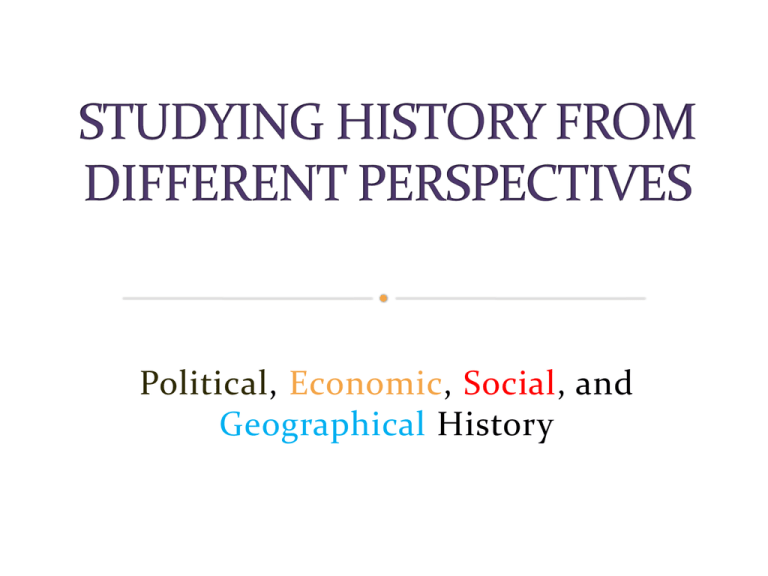
Political, Economic, Social, and Geographical History Many students look at history as simply a collection of facts, people, and events that are not very interwoven. History is in fact the study of these things, but it is also the recognition that events do not happen alone and only one at a time. Rather, they occur together, and over time, this can have profound changes in our history and the direction of society. When we are finished today you will be able to categorize historical events into one of four basic areas, thus allowing you to better understand the motivation for events in history. POLITICAL: This area of history deals with the government and its decisions and how they affect the people. ECONOMIC: This area of history deals with how we get the things that we want and need to live our lives. SOCIAL: This area of history deals with the different groups of people in society and how it affects our daily lives. GEOGRAPHICAL: This area of history deals with the areas of the physical world that are involved in historical events. LAND RESOURCES MONEY ($) POWER We all know something about the revolution, but did you know that there were many different ideas and events that led to it. Issues such as taxes, laws, freedoms, problems with money, and political leadership in the colonies all helped fuel the ideas of the revolution. Lets use the Revolution as a model to better understand the four main areas of historical study the we will consider throughout the coming year. Political history means looking at events through the perspective of government and its decision making. Examples are laws passed, the actions of leaders, and other government responses to events happening in society. The American Revolution had lots of political connections from the colonists not being represented to the type of government that would be created with a successful revolution. Economic history means looking at how historical events affected how people get the things that they need and want to survive and live comfortably. Examples include workers, how laws affect business, how innovation changes our lives, how our money system works, and others. The American Revolution had many economic elements. These include: taxation by the British, how colonial business was hurt by laws, and how the colonies were able to finance the fight for independence. Social history means looking at history from the perspective of how events changed the society and groups within society. Examples include: How has our ethnic background changed, and what groups and organizations influenced history. The American Revolution has many social elements. They include: The difference between Loyalists and Patriots, the contributions of women in the war and many others. This means looking at history from the viewpoint of where events take place as well as how the land and resources influence the direction of a nation. Examples include: Using maps to understand areas of the nation, resources that come from different areas, understanding how waterways influence society. The American Revolution has geographical elements including: How did the distance from America to England affect the war, what areas of the colonies saw the heaviest fighting, and many others. IMAGE #1 TECHNOCHTITLAN – AZTEC CAPITAL (1325-1519) GEOGRAPHY: Island capital – water systems were advanced – Mexico City now stands there. POLITICS: Class System ECONOMICS: Market place trading SOCIAL: Several Million People now in contact with Europeans RELIGION: God Huitzilopochtli (God of War & a Sun God) IMAGE #2 PRINTING PRESS (1440) – GUTENBERG GEOGRAPHY: Info. Spreads throughout Europe then the rest of the world POLITICS: Protestant Reformation ECONOMICS: supply and demand SOCIAL: Mass consumption of info. - Greek & Roman Classics & stimulated the Renaissance RELIGION: Martin Luther’s 95 Theses – Protestant Reformation IMAGE #3 TREATY OF TORDESILLAS (1494) GEOGRAPHY: Splitting the resources of the world POLITICS: Spain & Portugal ECONOMICS: Rights to trading routes: Riches of new lands & African trade SOCIAL: contact of native Americans RELIGION: supported by the Crown IMAGE #4 NINA, PINTA, & SANTA MARIA GEOGRAPHY: Spain: trans-Atlantic travel: new world POLITICS: sailed for the Spanish Crown: he was promised to be governor ECONOMICS: riches that were to come SOCIAL: engaging native Americans RELIGION: spread of Christianity IMAGE #5 SMALLPOX GEOGRAPHY: North & Central America POLITICS: “Biological Warfare” for westward expansion ECONOMICS: NA SOCIAL: Decimation of Native Americans RELIGION: NA The British forces at Fort Pitt (later to become Pittsburgh, Pennsylvania) purposefully gave smallpox-contaminated blankets and goods to Native Americans during the French and Indian Wars (1754-1763) in an attempt to weaken the Native American resistance to colonial expansion. Due to this and through natural spread, the epidemic that followed killed half of the Native American population. SOURCE: http://www.emedicinehealth.com/smallpox/article_em.htm IMAGE #6 JOHN WINTHROP GEOGRAPHY: Salem, Massachusetts (1628) POLITICS: Governor of Massachusetts Bay Colony ECONOMICS: Fishing & Trade SOCIAL: family, devotion, education , & the Bible (“City Upon a Hill”) RELIGION: Puritans (“Purify the Church of England”) IMAGE #7 BRADDOCK’S DEFEAT (July 9,1755) GEOGRAPHY: The Monongahela River (Pittsburgh) POLITICS: Battle over North America between the British & French ECONOMICS: Debt of the war causes the British to levy heavy taxes upon the colonists SOCIAL: Pits culture vs. culture RELIGION: NA IMAGE #8 BOSTON MASSACRE GEOGRAPHY: Boston, Massachusetts POLITICS: Revolution ECONOMICS: Taxation SOCIAL: Patriots vs. Loyalists RELIGION: NA IMAGE #9 1ST CONSTITUTIONAL CONVENTION (1787) GEOGRAPHY: Independence Hall, Philadelphia POLITICS: framing of the U.S. Constitution: ECONOMICS: scrapped the Articles of Confederation (inability to tax) SOCIAL: a formal Joining of the 13 states RELIGION: NA IMAGE #10 RATIFICATION OF THE CONSTITUTION GEOGRAPHY: 9 States joined POLITICS: Congress of the Confederation succeeded by the U.S. Congress: Virginia Plan & New Jersey Plan = Great Compromise ECONOMICS: taxation & trade issues at stake SOCIAL: nine of the thirteen original States ratify RELIGION:1st Amendment IMAGE #11 LEWIS & CLARK (1804-1806) GEOGRAPHY: Louisiana Purchase POLITICS: Thomas Jefferson commissioned ECONOMICS: Funded by Congress SOCIAL: Beginnings of further westward expansion RELIGION: NA IMAGE #12 FRANCIS SCOTT KEY (1779-1843) GEOGRAPHY: Fort McHenry – Baltimore, MD POLITICS: Second War for Independence – War of 1812 – “Mr. Madison’s War”: Impressments of Sailors: British support of Native Americans on the frontier ECONOMICS: Embargo Act SOCIAL: Star Spangled Banner (1814) – Becomes the National Anthem in 1931 RELIGION: NA IMAGE #13 ERIE CANAL (1808-1825) GEOGRAPHY: New York: Links the east to the west POLITICS: NY Governor – DeWitt Clinton ECONOMICS: Vast change as a part of the transportation boom and economic growth as a result SOCIAL: Clinton’s Ditch RELIGION: NA Early Transportation Revolution IMAGE #14 PRESIDENT ANDREW JACKSON (1828) GEOGRAPHY: First Pres. West of the Appalachians POLITICS: Democratic Party: Spoils system: Jacksonian Democracy: National Political Conventions (1832) ECONOMICS: Vetoed the Second Bank of the U.S. SOCIAL: “common man’s president”: Trail of Tears RELIGION: NA IMAGE #15 COTTON GIN - ELI WHITNEY (1793) GEOGRAPHY: Southern plantation life: Spread of slavery across the south POLITICS: Civil War ECONOMICS: profitable to grow cotton SOCIAL: demand for more slaves RELIGION: NA IMAGE #16 REVIVAL CAMP MEETING (1839) GEOGRAPHY: New England, New York (Burned Over District), Kentucky, Tennessee, Southern Ohio & The Frontier POLITICS: reform movements – temperance, prison reform, abolition, women’s suffrage, moral reform, public education & philanthropic endeavors ECONOMICS: NA SOCIAL: huge gatherings of the religious & potential converts RELIGION: Methodists & Baptists IMAGE #16 UNDERGROUND RAILROAD GEOGRAPHY: From the South all the way to Canada POLITICS: Civil War: Fugitive Slave Act ECONOMICS: Financial support from abolitionists in New York & Boston: reward for Harriet Tubman’s capture was $40,000 SOCIAL: “Stations” & “Conductors” RELIGION: NA IMAGE #18 FREDERICK DOUGLASS (1818-1895) GEOGRAPHY: Escaped from Baltimore, MD to New Bedford, Massachusetts: Later fled to England POLITICS: served as American minister to Haiti after Reconstruction ECONOMICS: bought his own freedom after he fled to England SOCIAL: Abolitionist newspaper The North Star: Helped recruit black troops RELIGION: NA IMAGE #19 SUSAN B. ANTHONY (1820-1906) GEOGRAPHY: New York – Seneca Falls POLITICS: National Woman Suffrage Association (NWSA)(1869): National American Woman Suffrage Association (NAWSA)(18921900): NWSA promoted woman in politics (Victoria Woodhall – 1872) ECONOMICS: NA SOCIAL: History of Woman Suffrage (1881-1902) RELIGION: NA IMAGE #20 MANIFEST DESTINY GEOGRAPHY: Atlantic to Pacific POLITICS: Native American policies & Land grants ECONOMICS: LAND→RESOURCES→$→POWER SOCIAL: absorbing many indigenous people along with French & Mexican RELIGION: Divine Providence IMAGE #21 THE ALAMO GEOGRAPHY: Mexico: Located in the center of San Antonio, Texas: POLITICS: Texas War for Independence (1835-1836) ECONOMICS: eventual expansion of slavery and the cotton kingdom SOCIAL: NA RELIGION: Originally built as a Catholic mission IMAGE #22 FUGITIVE SLAVE ACT GEOGRAPHY: territories of Mexican War: District of Columbia & California: Utah & New Mexico territories: POLITICS: First in 1793: more strict provision in the Compromise of 1850: Federal agents to arrest runaways anywhere in the U.S.: Personal Liberty Laws ECONOMICS: reward $ for captured slaves SOCIAL: uprisings and riots: tension within states RELIGION: NA IMAGE #23 JOHN BROWN (1800-1859) GEOGRAPHY: Pottawatomie, Kansas: Harpers Ferry, Virginia POLITICS: Abolitionist ECONOMICS: NA SOCIAL: martyr to Northerners: Ralph Waldo Emerson’s “John Brown’s Body” a popular Union Civil War song RELIGION: “A man of burning religious faith.”
